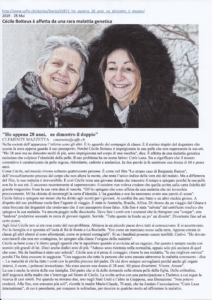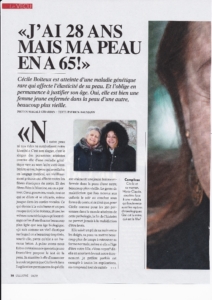Cécile suffers from a rare genetic disorder
CAFFE.ch, swiss online magazine (in Italian)
2019.05.05

Read the article on line :
http://www.caffe.ch/stories/Storie/62873_ho_appena_28_anni_ne_dimostro_il_doppio/
CAFFE.ch, swiss online magazine (in Italian)
2019.05.05

Read the article on line :
http://www.caffe.ch/stories/Storie/62873_ho_appena_28_anni_ne_dimostro_il_doppio/
L’illustré, swiss newspaper (in French)
2019.02.06

Watch the video : https://www.facebook.com/1081337022/posts/10215330750396949/
Read the article : https://www.cutislaxa.org/wp-content/uploads/2020/02/lillustre-2019.02.06.pdf
ARTERYLASTIC : First real therapeutic hope for vascular issue in Dominant Cutis Laxa.
ARTERYLASTIC derives from researches lead in Lyon (France) by Dr Romain Debret. Originating from the idea that if one can make prosthetics for a joint, maybe we could make prosthestics for a failing elastin, this project is funded by the French National Agency for Research. Selected in 2018, it will start in January 2019.
The project involves 3 laboratories from the Rhône-Alpes area: Laboratory for Tissue Biology and Therapeutic Engineering (National Center for Scientific Research, Lyon), Laboratory for Hypoxia and Cardiovascular and Respiratory Physiopathologies (National Institute of Health and Medical Research, Grenoble), and Sainbiose Laboratory (National Institute of Health and Medical Research, Saint-Etienne).
The main aim of the project is to develop a synthetic elastic protein as medicine agent to improve or restore the vascular elasticity when it is failing in genetic disorders such as Cutis Laxa and Williams Syndrome, but also in non syndromic pathologies such as sleeping apneia.
This project aims to analyse the way the synthetic protein is acting and evaluate its efficiency in pertinent biological models.
The « DHERMIC » project, which preceded ARTERYLASTIC, already provided a wide set of solid data regarding the skin for the synthetic elastic protein. Recent preliminary results regarding the integration in blood vessels walls in fishes and mice are very promising.
An important part of the work will also be dedicated to the pharmacological formulation and certification to allow for the implementation of Clinical Trials at the end of the project (late 2021).
| Helplines for rare disorders worldwide |
||
| Country | Organisation | Helpline & other modes of contact |
| Canada | Rare Disease Information and Resource Centre | +385 12441393 – info@rqmo.org www.rqmo.org/rare-disease-information-and-resource-centre/ |
| Croatia * | Croatian Help Line for Rare Diseases | +385 12441393 – rijetke.bolesti@gmail.com www.rijetke-bolesti.hr/rare-diseases-croatia Facebook group |
| Denmark * | Rare Diseases Denmark | +45 33140010 – helpline@sjaeldnediagnoser.dk sjaeldnediagnoser.dk/helpline/ |
| France * | Maladies Rares Info Services (MRIS) | + 33 156538136 – info-services@maladiesrares.org www.maladiesraresinfo.org |
| Germany | ACHSE Betroffenen- und Angehörigenberatung | +49 3033007080 – www.achse-online.de |
| Hungary * | Lifebelt | +36 617904533 – mentoov@rirosz.hu – mentoov.rirosz.hu/ |
| Ireland * | National Rare Diseases Office (NRDO) | +353 1800 24 03 65 or + 353 18545065 rare.diseases@mater.ie – www.hse.ie/eng/services |
| Italy * | Università di Padova, Coordinating Centre for Rare Diseases, Veneto Region | + 39 049 82 15 700 – malattierare@pediatria.unipd.it |
| Italy * | Telefono Verde Malattie Rare | +39 800896949 – https://www.iss.it/?p=171 |
| Italy * | Centro di ascolto malattie rare | +39 800 880101 – http://www.regione.toscana.it/-/centro-di-ascolto-per-le-malattie-rare |
| Italy * | Centro di ascolto per le malattie rare del Piemonte e della Valle d’Aosta | +39346.1059486 +39339.5203554 – segreteria@a-rare.it |
| Mexico | AcceSalud | accesalud@femexer.org |
| Norway | Norwegian National Advisory Unit on Rare Disorders Oslo University Hospital | +47 23 02 69 75 – liegen@ous-hf.no Helsenorge.no/Sjeldnediagnoser |
| Portugal * | Linha Rara | +351 300505700 – info@rarissimas.pt |
| Romania * | Romanian National Alliance for Rare Disease (NoRo Help Line) | +40 260611214 – office@apwromania.ro |
| Romania * | Romanian Myasthenia Gravis Info Centre | +40 744704399 – asociatia.miastenia@gmail.com |
| Serbia * | NORBS | +381 800333103 – office@norbs.rs – www.norbs.rs/ |
| Spain * | SIO Feder | +34 918221725 – sio@enfermedades-raras.org |
| Switzerland * | Infos Maladies Rares | +41 848314372 – contact@infomaladiesrares.ch www.info-maladies-rares.ch/ |
| Switzerland * | Seltene Krankheiten | +41 442663535 – selten@kispi.uzh.ch – www.kispi.uzh.ch |
| USA | GARD Genetic and Rare Diseases Information Center | +1 8882052311 |
| Wolrdwide | ThinkGenetic | https://www.thinkgenetic.com/
medical advice from Genetic counselors : https://www.thinkgenetic.com/contact-counselor |
In March, the American Journal of Medecine Genetics published an article showing that a mutation on the gene PTDSS1 leads to a very rare type of Cutis Laxa : Lenz-Majewski Syndrome (LMS) . It includes Cutis Laxa with growth delay, dwarfism and intellectual delay. According to this study of 3 cases, this is a new type of Cutis Laxa that needs to be added to those already identified.
ATP6V1E1 or ATP6V1A, are the new mutations recently published by a team of researchers including, among others, les nouvelles mutations publiées par une équipe de chercheurs incluant, entre autres, Mmes Gardeitchik, Mohammed, De Paepe, Malfait and Morava as well as Messrs Kornak, Wevers and Callewaert, who are researchers we are in contact with.
Those mutations can be included in Autosomal Recessive Cutis Laxa type 2 (ARCL2). They lead to Glycosylation Abnormalities (CDGs).
This site uses cookies. By continuing to browse the site, you are agreeing to our use of cookies.
OKLearn moreYou can read about our cookies and privacy settings in detail on our Privacy Policy Page.
Privacy Policy